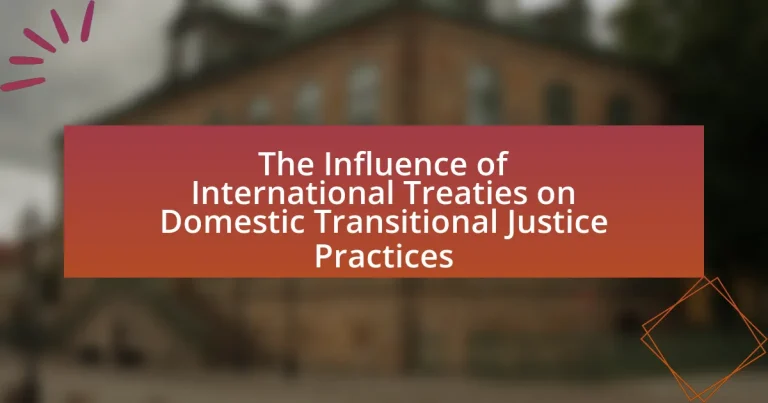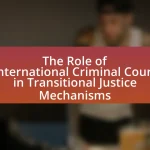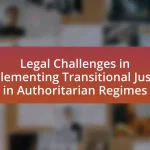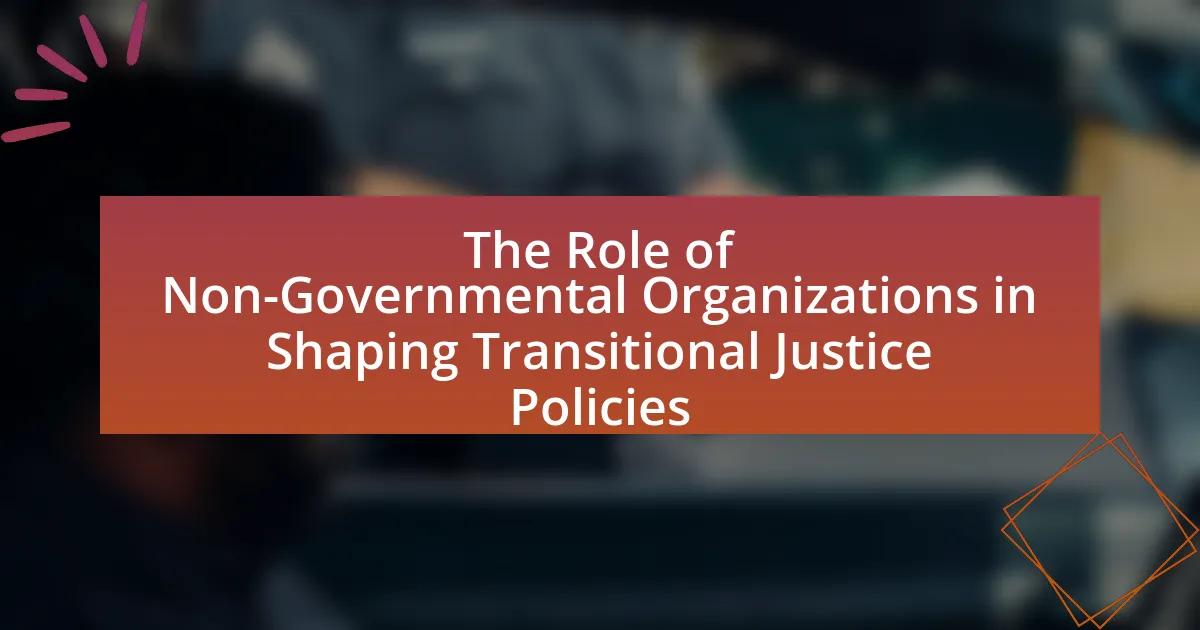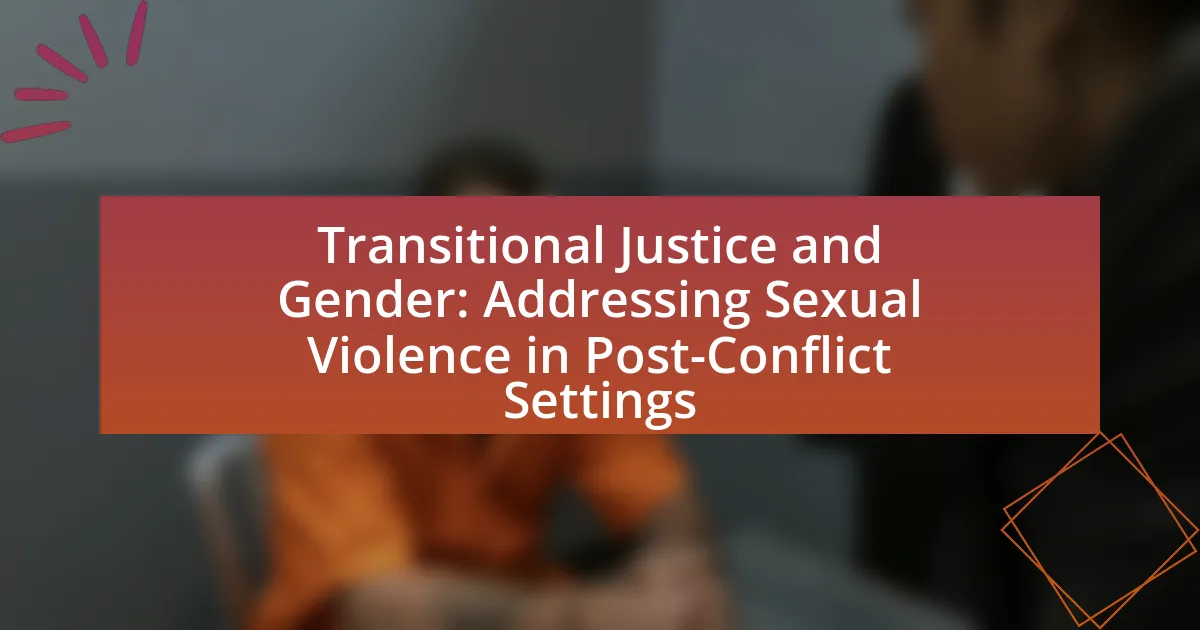The article examines the influence of international treaties on domestic transitional justice practices, highlighting how these treaties establish legal frameworks and standards that countries are encouraged to adopt. It discusses key treaties such as the Rome Statute of the International Criminal Court, the International Covenant on Civil and Political Rights, and the Convention Against Torture, which shape national legal systems and promote accountability for human rights violations. The article also addresses the mechanisms through which treaties are incorporated into domestic law, the role of civil society, and the challenges faced in aligning national practices with international obligations. Additionally, it explores the positive and negative outcomes of treaty influence on transitional justice, emphasizing the importance of local ownership and collaboration in enhancing the effectiveness of these international agreements.
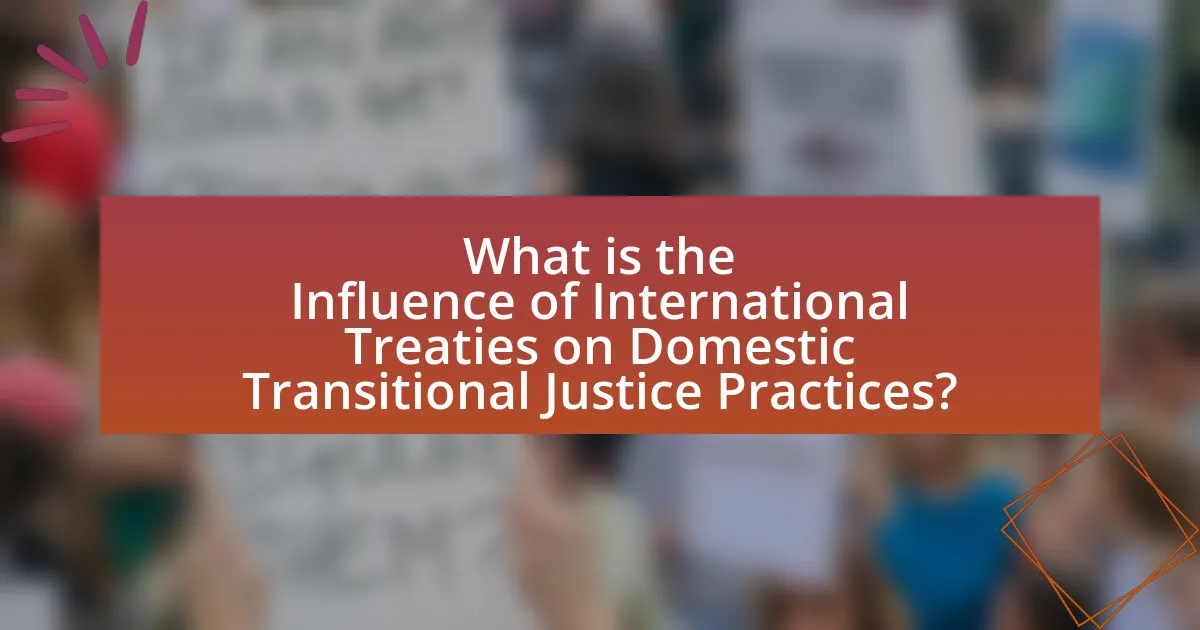
What is the Influence of International Treaties on Domestic Transitional Justice Practices?
International treaties significantly influence domestic transitional justice practices by establishing legal frameworks and standards that countries are encouraged to adopt. These treaties, such as the Rome Statute of the International Criminal Court, set precedents for accountability and victim rights, compelling nations to align their domestic laws with international norms. For instance, countries that ratify treaties often implement legal reforms to address war crimes and human rights violations, reflecting their commitment to uphold international standards. This alignment is evidenced by the incorporation of treaty obligations into national legislation, which can enhance the effectiveness of transitional justice mechanisms, such as truth commissions and reparations programs.
How do international treaties shape the framework of transitional justice?
International treaties shape the framework of transitional justice by establishing legal standards and norms that guide states in addressing past human rights violations. These treaties, such as the International Covenant on Civil and Political Rights and the Convention Against Torture, create obligations for states to ensure accountability, promote truth-seeking, and provide reparations to victims. For instance, the Rome Statute of the International Criminal Court outlines principles for prosecuting war crimes and crimes against humanity, influencing national legal systems to incorporate similar mechanisms. Consequently, these international agreements serve as benchmarks for domestic transitional justice processes, encouraging states to align their practices with global human rights standards and fostering international cooperation in the pursuit of justice.
What are the key international treaties relevant to transitional justice?
The key international treaties relevant to transitional justice include the International Covenant on Civil and Political Rights (ICCPR), the Convention Against Torture and Other Cruel, Inhuman or Degrading Treatment or Punishment (CAT), and the Rome Statute of the International Criminal Court (ICC). The ICCPR, adopted in 1966, emphasizes the protection of civil and political rights, which are essential for ensuring accountability and justice in post-conflict societies. The CAT, established in 1984, specifically addresses the prohibition of torture and mandates states to prevent and punish acts of torture, thereby supporting victims’ rights. The Rome Statute, enacted in 2002, provides a framework for prosecuting individuals for war crimes, genocide, and crimes against humanity, reinforcing the principle of accountability in transitional justice processes. These treaties collectively influence domestic practices by establishing legal standards and obligations that states must adhere to in their transitional justice efforts.
How do these treaties define transitional justice principles?
International treaties define transitional justice principles by establishing frameworks that prioritize accountability, truth-seeking, reparations, and institutional reform in post-conflict societies. For instance, the Rome Statute of the International Criminal Court emphasizes the importance of prosecuting war crimes and crimes against humanity, thereby reinforcing the principle of accountability. Additionally, the United Nations’ Basic Principles and Guidelines on the Right to a Remedy and Reparation outlines the necessity for victims to receive reparations, which supports the principle of redress. These treaties collectively guide domestic practices by providing legal standards and moral imperatives that nations are encouraged to adopt in their transitional justice processes.
Why is the relationship between international treaties and domestic practices significant?
The relationship between international treaties and domestic practices is significant because it shapes how countries implement and adhere to international norms and standards within their legal frameworks. This relationship ensures that commitments made at the international level, such as human rights protections and transitional justice mechanisms, are reflected in national laws and policies. For instance, the adoption of the Rome Statute by various countries has led to the incorporation of principles of accountability for war crimes into their domestic legal systems, thereby enhancing the effectiveness of transitional justice initiatives. This alignment not only promotes compliance with international obligations but also fosters trust and cooperation among nations, as evidenced by the increased participation of states in international human rights treaties and their subsequent domestic reforms.
What impact do international treaties have on national legal systems?
International treaties significantly influence national legal systems by establishing binding obligations that member states must incorporate into their domestic laws. These treaties can lead to the harmonization of laws across countries, as seen in human rights treaties like the International Covenant on Civil and Political Rights, which requires signatory states to align their legal frameworks with international standards. Additionally, treaties can serve as a basis for judicial decisions and legislative reforms, compelling national courts to interpret laws in a manner consistent with international obligations. For example, the European Convention on Human Rights has been instrumental in shaping national legal practices in member states, leading to changes in laws regarding due process and individual rights.
How do treaties influence public perception of justice?
Treaties influence public perception of justice by establishing international norms and standards that shape domestic legal frameworks. When countries ratify treaties, such as the International Covenant on Civil and Political Rights, they commit to uphold specific human rights standards, which can enhance public trust in justice systems. For instance, the implementation of the Rome Statute of the International Criminal Court has led to increased awareness and expectations regarding accountability for war crimes, thereby influencing how communities perceive justice. This alignment with international legal obligations often encourages public engagement and advocacy for justice reforms, reinforcing the belief that justice is not only a domestic concern but also a global responsibility.
What challenges arise from the implementation of international treaties in domestic contexts?
Challenges that arise from the implementation of international treaties in domestic contexts include legal inconsistencies, political resistance, and resource limitations. Legal inconsistencies occur when domestic laws conflict with treaty obligations, leading to difficulties in enforcement and compliance. Political resistance often stems from national interests or ideologies that may oppose the treaty’s provisions, hindering effective implementation. Resource limitations, including financial and human capital constraints, can impede the necessary actions to fulfill treaty commitments. For instance, the International Criminal Court’s Rome Statute has faced challenges in various countries due to these factors, illustrating the complexities involved in aligning international obligations with domestic legal and political frameworks.
What are the common obstacles faced by countries in aligning with international standards?
Countries commonly face legal, political, and economic obstacles in aligning with international standards. Legal obstacles include the lack of compatible domestic laws that reflect international norms, which can hinder compliance. Politically, resistance from government entities or influential groups may arise due to differing national interests or ideologies, making it difficult to implement international agreements. Economically, limited resources can restrict a country’s ability to invest in necessary reforms or infrastructure to meet these standards. For instance, a study by the United Nations Development Programme highlights that developing nations often struggle with resource allocation, impacting their capacity to align with international human rights standards effectively.
How do political and cultural factors affect treaty implementation?
Political and cultural factors significantly influence treaty implementation by shaping the willingness and ability of states to adhere to international agreements. Political stability, government priorities, and the presence of supportive institutions can facilitate or hinder the execution of treaties. For instance, in countries with strong democratic governance, there is often greater compliance with human rights treaties due to public accountability and civil society engagement. Conversely, authoritarian regimes may disregard treaty obligations if they conflict with their political interests.
Cultural factors, including societal values and historical contexts, also play a crucial role. In societies where there is a strong emphasis on collective memory and reconciliation, treaties related to transitional justice are more likely to be implemented effectively. For example, in South Africa, the Truth and Reconciliation Commission was supported by a cultural commitment to healing post-apartheid, which aided in the implementation of related treaties. In contrast, in cultures where there is resistance to acknowledging past injustices, treaty implementation may face significant obstacles. Thus, both political and cultural dimensions are essential in determining the success of treaty implementation in the context of transitional justice.
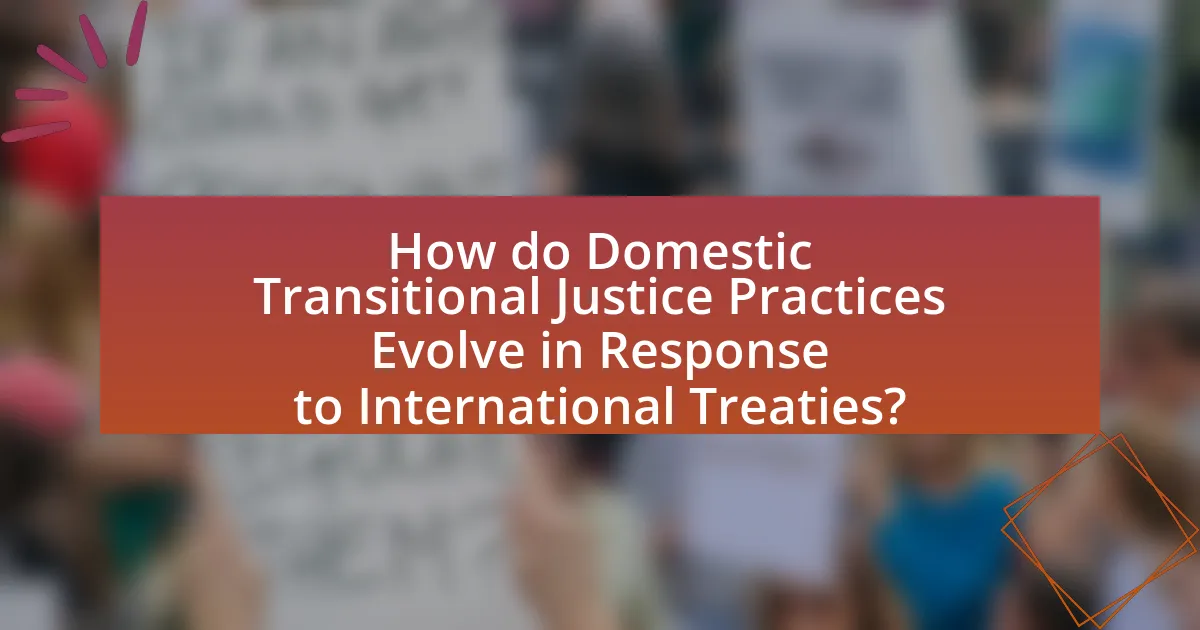
How do Domestic Transitional Justice Practices Evolve in Response to International Treaties?
Domestic transitional justice practices evolve in response to international treaties by aligning their frameworks and mechanisms with the standards and obligations set forth in those treaties. For instance, when countries ratify treaties such as the Rome Statute of the International Criminal Court, they often implement legal reforms to incorporate principles of accountability, victim rights, and non-recurrence into their domestic laws. This alignment is evidenced by the establishment of truth commissions and reparations programs that reflect the commitments made under international law, as seen in countries like South Africa and Argentina, where transitional justice measures were significantly influenced by international human rights norms.
What mechanisms facilitate the incorporation of international treaties into domestic law?
International treaties are incorporated into domestic law through mechanisms such as legislative enactment, executive agreements, and judicial interpretation. Legislative enactment involves the formal approval of treaties by national legislatures, which may require specific procedures, such as a supermajority vote, to ensure compliance with constitutional requirements. Executive agreements, on the other hand, allow the executive branch to implement treaties without legislative approval, provided they do not conflict with existing laws. Judicial interpretation plays a role as courts may interpret domestic laws in light of international treaty obligations, thereby integrating them into the legal framework. These mechanisms ensure that international commitments are effectively translated into enforceable domestic legal standards, promoting adherence to international norms within national jurisdictions.
How do legislative processes adapt to include treaty obligations?
Legislative processes adapt to include treaty obligations by amending existing laws or enacting new legislation that aligns with the terms of the treaty. This adaptation often involves a review of domestic legal frameworks to ensure compliance with international standards set forth in the treaty. For instance, countries may establish specific statutes that incorporate the principles of human rights treaties, thereby facilitating the implementation of transitional justice measures. Historical examples include the incorporation of the Rome Statute of the International Criminal Court into national laws, which required states to adjust their legal systems to prosecute war crimes and crimes against humanity effectively.
What role do judicial systems play in enforcing treaty provisions?
Judicial systems play a crucial role in enforcing treaty provisions by interpreting and applying international law within domestic legal frameworks. They ensure compliance with treaties by adjudicating disputes, holding violators accountable, and providing remedies for breaches. For instance, national courts may invoke international treaties to support human rights claims, as seen in cases where domestic laws align with international obligations, such as the Convention on the Rights of the Child. This enforcement mechanism is vital for upholding the rule of law and promoting justice, as it allows individuals to seek redress and reinforces the commitment of states to their international obligations.
How do domestic actors respond to international treaty obligations?
Domestic actors respond to international treaty obligations by adapting their legal frameworks, policies, and practices to align with the commitments outlined in those treaties. For instance, when a country ratifies a human rights treaty, domestic legislators may enact new laws or amend existing ones to ensure compliance with international standards. This process often involves consultations with various stakeholders, including civil society organizations and legal experts, to facilitate the integration of treaty obligations into national law.
Evidence of this response can be seen in the implementation of the Convention on the Elimination of All Forms of Discrimination Against Women (CEDAW), where many countries have established national action plans and legal reforms aimed at promoting gender equality in accordance with their treaty commitments. Such actions demonstrate how domestic actors actively engage in the process of fulfilling international obligations, thereby influencing transitional justice practices within their jurisdictions.
What is the role of civil society in promoting transitional justice aligned with treaties?
Civil society plays a crucial role in promoting transitional justice aligned with treaties by advocating for accountability, transparency, and the protection of human rights. Organizations within civil society often mobilize communities, raise awareness about treaty obligations, and hold governments accountable for implementing transitional justice measures. For instance, civil society groups have been instrumental in the establishment of truth commissions and reparations programs, ensuring that these initiatives reflect the principles outlined in international treaties such as the International Covenant on Civil and Political Rights. Their involvement often leads to greater public participation and trust in the transitional justice process, thereby enhancing its legitimacy and effectiveness.
How do local governments adapt their policies in response to international treaties?
Local governments adapt their policies in response to international treaties by aligning local legislation and practices with the obligations set forth in those treaties. This alignment often involves revising existing laws, creating new regulations, and implementing programs that reflect the principles and requirements of the treaties. For instance, when a country ratifies a human rights treaty, local governments may establish mechanisms for accountability, such as truth commissions or reparations programs, to comply with international standards. Evidence of this adaptation can be seen in the implementation of the Convention on the Rights of the Child, where many local governments have enacted child protection laws and policies that mirror the treaty’s provisions, thereby demonstrating a direct response to international commitments.
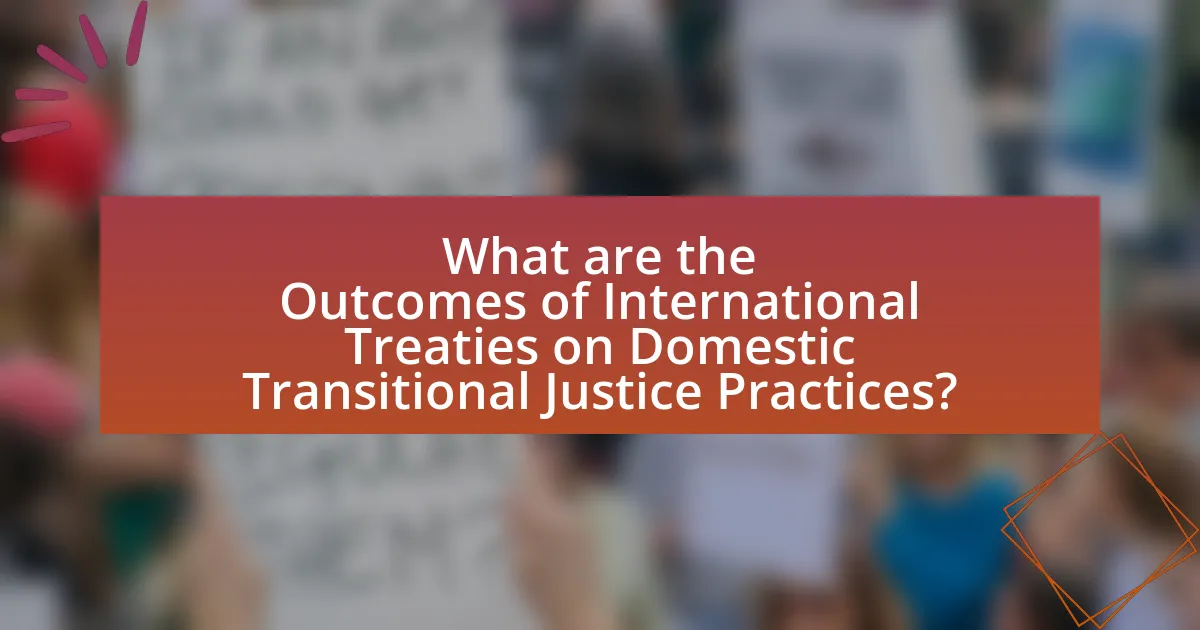
What are the Outcomes of International Treaties on Domestic Transitional Justice Practices?
International treaties significantly influence domestic transitional justice practices by establishing legal frameworks and standards that countries are encouraged to adopt. These treaties often promote accountability for human rights violations, leading to the establishment of truth commissions, reparations programs, and judicial mechanisms. For instance, the Rome Statute of the International Criminal Court has prompted many nations to strengthen their legal systems to prosecute war crimes and crimes against humanity, thereby enhancing domestic accountability measures. Additionally, treaties such as the Convention Against Torture have led to the incorporation of anti-torture laws in various jurisdictions, reflecting a commitment to uphold human rights standards. These outcomes demonstrate how international legal obligations can shape and improve domestic approaches to transitional justice.
What positive changes can be observed in transitional justice practices due to international treaties?
International treaties have led to significant positive changes in transitional justice practices by establishing legal frameworks that promote accountability, truth-seeking, and reparations for victims. These treaties, such as the Rome Statute of the International Criminal Court, have encouraged countries to adopt laws that align with international human rights standards, thereby enhancing the effectiveness of domestic judicial systems. For instance, the implementation of the Convention Against Torture has prompted nations to criminalize torture and establish mechanisms for victim redress, resulting in increased trust in legal institutions. Furthermore, treaties often facilitate international cooperation, enabling states to share best practices and resources, which strengthens local capacities for addressing past atrocities.
How do treaties enhance accountability for human rights violations?
Treaties enhance accountability for human rights violations by establishing legal frameworks that obligate states to adhere to international human rights standards. These legal instruments create mechanisms for monitoring compliance, such as reporting requirements and the establishment of international bodies that can investigate violations. For instance, the International Covenant on Civil and Political Rights mandates state parties to respect and ensure the rights recognized in the treaty, thereby holding them accountable for any breaches. Additionally, treaties often provide avenues for victims to seek justice, such as through international courts or tribunals, which further reinforces the accountability of states for human rights abuses.
What improvements in victim support and reparations are linked to treaty influence?
International treaties significantly enhance victim support and reparations by establishing legal frameworks that obligate states to provide redress for human rights violations. For instance, treaties such as the Convention on the Rights of the Child and the Convention on the Elimination of All Forms of Discrimination Against Women compel signatory countries to implement measures that ensure victims receive adequate support and reparations. Evidence shows that countries adhering to these treaties often develop comprehensive victim assistance programs, including psychological support, legal aid, and financial compensation, which are crucial for the recovery and reintegration of victims into society. Additionally, the establishment of monitoring bodies under these treaties ensures accountability and encourages states to fulfill their obligations, leading to improved outcomes for victims.
What negative consequences can arise from the influence of international treaties?
International treaties can lead to negative consequences such as the undermining of national sovereignty and the imposition of foreign legal standards that may not align with domestic values. For instance, when countries ratify treaties that mandate specific human rights practices, they may face pressure to alter their legal frameworks, which can conflict with local customs or laws. This tension can result in domestic backlash, as seen in cases where communities resist changes perceived as externally imposed, leading to social unrest. Additionally, the prioritization of treaty obligations over local needs can divert resources from pressing domestic issues, ultimately hindering effective transitional justice processes.
How can the imposition of international standards lead to resistance or backlash?
The imposition of international standards can lead to resistance or backlash due to perceived threats to national sovereignty and cultural identity. When countries feel that external entities dictate their legal and social frameworks, they may react defensively to protect their autonomy. For instance, in 2005, the United States withdrew from the International Criminal Court’s jurisdiction, citing concerns over national sovereignty and the potential for politically motivated prosecutions. This illustrates how the imposition of international norms can provoke a strong nationalistic response, resulting in a rejection of those standards. Additionally, local populations may view international standards as incompatible with their cultural practices, leading to social unrest and opposition movements.
What are the risks of superficial compliance with treaty obligations?
Superficial compliance with treaty obligations poses significant risks, including undermining the credibility of international law and fostering a culture of impunity. When states engage in minimal adherence to treaties, they may create a façade of commitment while failing to implement substantive changes, which can lead to violations of human rights and a lack of accountability. Historical examples, such as the failure of certain countries to fully comply with the Rome Statute of the International Criminal Court, illustrate how superficial compliance can result in ongoing atrocities and diminished trust in international legal frameworks. This lack of genuine commitment can also weaken the effectiveness of transitional justice mechanisms, as victims may perceive these processes as insincere or ineffective, ultimately hindering reconciliation efforts and perpetuating cycles of violence.
What best practices can enhance the effectiveness of international treaties in domestic transitional justice?
Best practices that can enhance the effectiveness of international treaties in domestic transitional justice include ensuring local ownership of the processes, integrating international standards into national legislation, and fostering collaboration between international and domestic actors. Local ownership is crucial as it promotes community engagement and accountability, which are essential for sustainable justice outcomes. Integrating international standards into national legislation ensures that domestic laws align with global human rights norms, thereby strengthening legal frameworks. Collaboration between international and domestic actors facilitates knowledge sharing and resource mobilization, which can enhance the capacity of local institutions to implement transitional justice measures effectively. These practices are supported by evidence from various transitional justice contexts, such as the successful implementation of the Truth and Reconciliation Commission in South Africa, which emphasized local participation and adherence to international human rights standards.
